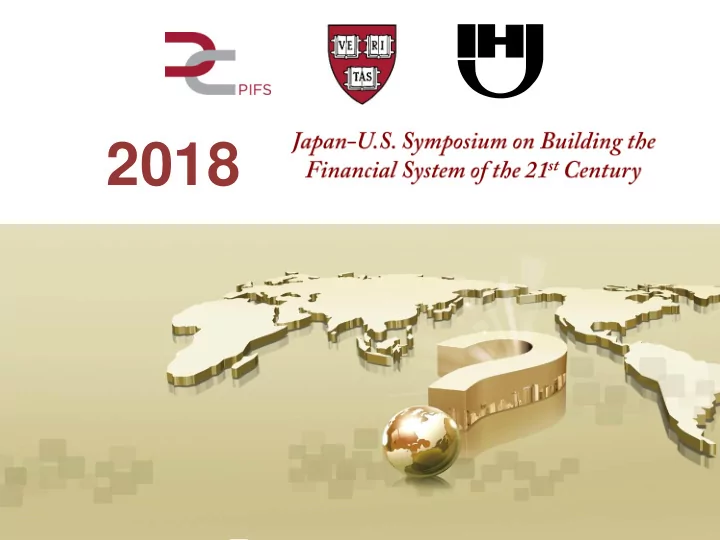

2018
Trumponomics and Financial Deregulation: Impact on International FIs
Trumponomics • Is there a coherent program? – Fiscal: tax cuts plus increased spending – Regulatory agenda: pro-growth, based on cost-benefit – Trade agenda: “fair and reciprocal” • Highly confrontational – effective tactic or threat to global system and trust? • Is core objective containment of China? • Desire to make currency central element of trade agreements • Effects – Increased growth, lower regulatory burden • Is rapid growth sustainable? – Regulatory effects • How much change for large FIs? • Are “regulatory vacuums” (fintech, non -banks) opening door to next crisis?
Diverging Approaches to Regulation • Dilemmas of financial regulation – Stability (Europe) vs. growth (US, Japan) – Function vs. entity – Principles vs. rules – What constitutes a level playing field? • International coordination – Is US willing to abide by international agreements? – Is US still able to set global agenda? • Importance of US-Japan cooperation – Will there be sufficient trust to cooperate in crises?
Key Issues for Regulators • Fragmentation – Derivatives: onshoring of clearing by EU in reaction toBrexit – Ringfencing of bank capital – Overlapping and contradictory regulations • Risk migration – From banks and insurers to fintechs, non-banks, asset managers – Are we creating conditions for the next crisis? • Insurance – If Solvency II is basis of global regulations, will stunt ability to invest in growth assets – Fintech incursions – JFSA is way ahead – Postal insurance still privileged relative to private sector • Data and Regulation – Data protection and privacy – Data localization • Uncertainty as regulatory regimes diverge – What rules will apply to Japanese and other foreign bank subsidiaries in US? – How will US-EU divergence be managed for multinational FIs?
International Cooperation • Financial industry increasingly globalized, but regulation less coordinated – Implications for crisis management: is US more isolated and/or vulnerable? • US-Japan cooperation – Common preference for growth-oriented regulation – Opportunities for cooperation to push growth to top of G20 agenda • Bilateral vs. multilateral – Trump has stated preference for bilateral – Will this be stumbling block to global supply chains and regulatory cooperation? • Particularly for electronics and IT, where security is implicated – Provisions of bilateral agreement can serve as templates for broader cooperation • Perhaps US-Japan FTA is an opportunity for both countries to set precedent – Will CFIUS be just China-focused or will it affect FDI from Japan and elsewhere?
Financial Technology and Banking: Threats and Opportunities
What Do We Mean by Fintech? • Client-facing vs. operational – Not all fintechs are alien disruptors – Fintech can also improve existing FI operations and functions (trading, ledgers, credit assessment, KYC, etc.) • Some key disruptive technologies – AI and Big Data – credit rating, trading, roboadvising, etc. – Distributed ledgers – not just cryptocurrencies; record-keeping and settlement probably more important – Platformization – Etherium, etc. • What is unchanged? – Trust remains key to financial intermediation – Many fintech functions are just more efficient ways of managing standard tasks • What is different? – New products and services – New algorithms and sources of data
Uses and Implications • Cryptocurrencies – Public vs. private vs. token – Are they currency or asset? – Should private cryptocurrencies even be allowed? • Money laundering, tax evasion concerns • Potential impact on monetary policy • Distributed ledger technology experiments – ASX declaration (and postponement) – Shipping, trade finance, custody, post-trade settlement – Still testing within and among traditional FIs • Insuretech – Biometric verification – Claims adjustment through Big Data, AI, sensors – Streamlining processes and client-facing technologies • Fraudulent activities – May damage reputation of fintechs, slow down innovation
Regulatory Challenges • Whom to regulate? – When does a fintech become a regulated FI? – How to regulate platforms and vendors? • Regulation vs. innovation – FIs need to understand regulatory environment – Many fintechs see themselves as tech firms, lack understanding of financial or legal context – Regulatory sandboxes as intermediate • What to regulate – Data security and privacy – Prudential – AML, KYC – Resilience planning
Regulatory Challenges, cont. • Fintech risks – Herd behavior stemming from common strategies – Unforeseen consequences of new, unproven data and algorithms – Fraud and consumer protection • Regulators’ capabilities – Knowhow and tech capabilities • Regulators around the world need to improve • Via own staff or public-private advisory mechanisms • Investor education – Cross-border cooperation • Whose jurisdiction? How to manage?
Other Issues • Who wins and loses? – Redistribution of value from traditional FIs to new actors and clients – Tendency of scalable tech toward concentration – Small FIs likely to lose out • Rising concentration in finance • Reliance on platforms – small banks may become just servicers – Generational issues affect implementation, demand for fintech services • Japan issues – Are Japanese FIs and software firms up to the challenge? • Need to develop skills • Even large FIs playing catch-up; must embrace change – Japanese people still love cash – Japan is ahead of the game but regulatory framework still a work in progress • Learning from Mt. Gox and Coincheck • ICOs still not allowed • Sandboxes not yet in place
UPCOMING EVENTS Europe-U.S. Symposium Paris, France March 20-22, 2019 China-U.S. Symposium Washington, DC June 5-7, 2019 To receive an invitation to other PIFS Symposia, or to recommend your colleagues for participation, please contact: Whitney Vasey wvasey@pifsinternational.org | 857-242-6072 www.pifsinternational.org
Recommend
More recommend